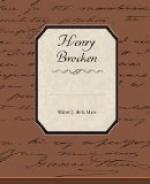My friend eyed me brightly and busily as a starling. “You danced fine, sir,” he said. “Oh! it is a pleasure to me. Ay, and now I come to consider it, methought I did hear hoofs behind me that might yet be echo. No, but I did not think: ’twas but my ear cried to his dreaming master. Ever dreaming; God help at last the awakening! But well met, well met, I say again. I am cheered. And you but just in time! Nay, I would not have missed him for a ransom. So—so—this leg, that leg; up now—hands over down we go! Lackaday, I am old bones for such freaks. Once!... ‘Memento mori!’ say I, and smell the shower the sweeter for it. Be seated, sir, bench or stool, wheresoever you’d be. You’re looking peaked. That burden rings in my skull like a bagpipe. Toot-a-tootie, toot-a-toot! Och, sad days!”
We devoured our meal of cold meats and pickled fish, fruit and junket and a kind of harsh cheese, as if in contest for a wager. And copious was the thin spicy wine with which we swam it home. Ever and again my host would desist, to whistle, or croon (with a packed mouth) in the dismallest of tenors, a stave or two of the tune we had danced to, bobbing head and foot in sternest time. Then a great vacancy would overspread his face turned to the window, as suddenly to gather to a cheerful smile, and light, irradiated, once more on me. Then down would drop his chin over his plate, and away go finger and spoon among his victuals in a dance as brisk and whole-hearted as the other.
He took me out again into his garden after supper, and we walked beneath the trees.
“’Tis bliss to be a bachelor, sir,” he said, gazing on the resinous trunk of an old damson tree. “I gorge, I guzzle; I am merry, am melancholy; studious, harmonical, drowsy,—and none to scold or deny me. For the rest, why, youth is vain: yet youth had pleasure—innocence and delight. I chew the cud of many a peaceful acre. Ay, I have nibbled roses in my time. But now, what now? I have lived so long far from courts and courtesy, grace and fashion, and am so much my own close and indifferent friend—Why! he is happy who has solitude for housemate, company for guest. I say it, I say it; I marry daily wives of memory’s fashioning, and dream at peace.”
It seemed an old bone he picked with Destiny.
“There’s much to be said,” I replied as profoundly as I could.
The air he now lulled youth asleep with was a very cheerless threnody, but he brightened once more at praise of his delightful orchard.
“You like it, sir? You speak kindly, sir. It is my all; root and branch: how many a summer’s moons have I seen shine hereon! I know it—there is bliss to come;—miraculous Paradise for men even dull as I. Yet ’twill be strange to me—without my house and orchard. Age tends to earth, sir, till even an odour may awake the dead—a branch in the air call with its fluttering a face beyond Time to vanquish dear. ‘Soul, soul,’ I cry, ’forget thy dust, forget thy vaunting ashes!’—and speak in vain. So’s life!”




